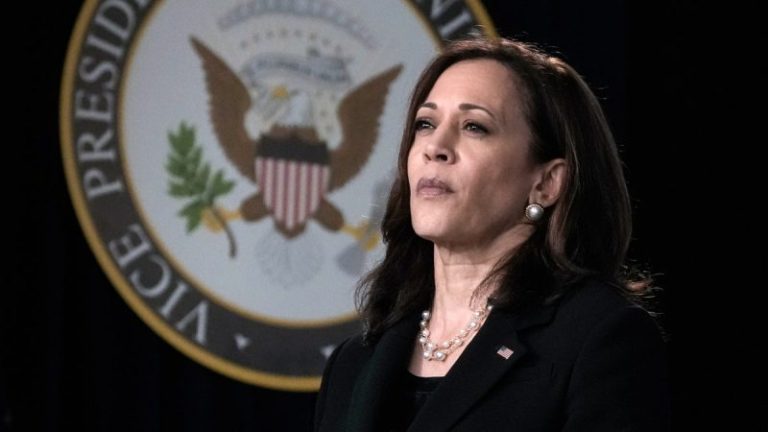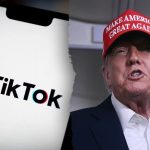‘He has to run because she can’t.’
‘She’ was Vice President Kamala Harris. ‘He’ was President Joe Biden. The message was clear: Biden had to run because his team didn’t believe she could.
‘Then why did you pick her in the first place?’ I asked as I sank back into my seat on Brightstar, the first lady’s plane.
Silence. Deflection. Business as usual.
We were instructed to parrot one line — ‘No one runs for president for four years.’ That was the strategy.
Harris’s forthcoming book, according to recently released excerpts, says what insiders whispered for years: the Biden bubble was full of bullies. The former vice president is finally saying the quiet part out loud.
Biden won the most votes of anyone for president in our country’s history. But he never won the hearts and minds of the American people, and especially not of his own party. That fragile foundation collapsed fast.
The Biden White House was filled with its share of cartoonist characters out of a badly cast high school version of ‘West Side Story.’ They thought they were a ‘BFD’ because they had worked in a previous administration or because our campaign defied the odds and beat expectations. But they had no instincts for the shifting media and political landscape — and no instinct for politics as it is now lived and practiced in the age of Donald Trump.
Speaker Emerita Nancy Pelosi was more direct, ‘I’ve never been that impressed with his political operation,’ referring to Biden’s team.
There was no pragmatic truth-teller, because no one admitted that we weren’t a movement. We swaggered like we’d won President Barack Obama’s mandate or his congressional majorities. We hadn’t. We lost 13 Democratic House seats on our way in. From the moment Biden won the nomination, no one ever wanted to admit the obvious: Democrats felt stuck with us, not inspired by us.
Inside the White House, the Regina Georges of Biden’s circle ruled like mean girls and policed loyalty. Staff weren’t serving a president and first lady — they were serving a cult. You never knew when Regina was in charge or when the Bidens were. It was all blurred.
Joe and Jill Biden were warm, decent, empathetic. But they enabled some of the nastiest and most mean-spirted people I’ve ever encountered in politics. That contradiction defines the Biden era.
I believed in Joe Biden once. After hearing him and Jill deliver barnburner speeches at the 2018 Human Rights Campaign gala, I was convinced he was the champion to take on Trump. As someone who endured relentless bullying growing up, Biden’s words about standing up for LGBT youth resonated. I left determined to join his effort.
One year later, Biden was in the race, and I was chief spokesperson to his very influential and active spouse.
In the summer of 2020, Jill reintroduced herself to the country while launching ‘Joey,’ her children’s book about young Joe Biden — a natural leader who stood up to bullies.
‘School was where the bullies were.’ He stood up for himself and ‘also defended others from bullies,’ Jill wrote.
Speaker Emerita Nancy Pelosi was more direct, ‘I’ve never been that impressed with his political operation,’ referring to Biden’s team.
‘We were expected to stand up to bullies,’ Valerie Biden Owens wrote in her memoir, ‘Growing Up Biden.’
Biden’s final mission, he said, was to save the country from Trump — who Democrats consider to be the ultimate bully.
But bullies are everywhere, even among Democrats, and despite his brand — even around Biden.
When I entered the fraught world of part-time punditry, there were times I questioned the strategic direction of the Biden reelection effort. When the economic message was ‘Bidenomics is working,’ I explained why it was an error and pushed alternatives. When the polls were bad, I said so. How could I say the sky is red when we all know it’s blue?
‘It will always feel like friendly fire to them,’ MSNBC television host Nicolle Wallace warned me. ‘But all you have is your credibility,’ she emphasized.
I wanted to be taken seriously, not just another robot regurgitating thoughtless talking points. I balanced my love for and personal loyalty to the Biden family with candid and thoughtful analysis.
But the president’s bullies didn’t see it that way. To them, I had taken off the team jersey by pointing out missed opportunities and mistakes, so they came for me.
The example they tried to make of me was meant to serve as a warning to any Democrat who raised concerns ahead of 2024. The same bullies who claimed to serve a president who despised bullies were sending me a message: shut up or we’ll humiliate you.
In time, however, the roots of their insecurity would be revealed to the entire world on a debate stage, one tragic June night in Atlanta. Biden’s bullies and their intimidation tactics would crumble over the course of four long, hot, summer weeks — along with their credibility.
Bullies don’t win. They implode.
Biden’s bullies dragged him down — and tried to drag Harris with him. Now, they’re out for her — again.
Recently, we saw a glimpse of that vindictiveness when a few of my former teammates reacted with ugly, and of course, blind quotes to the release of Harris’s book excerpts.
Inside the White House, the Regina Georges of Biden’s circle ruled like mean girls and policed loyalty.
But so far, Harris isn’t bending. Not this time. She sees what I saw. What we all eventually saw. And she is standing up to them.
As she launches her book tour on MSNBC’s ‘Rachel Maddow,’ I hope she continues to speak with unfiltered candor about her experience.
Take it from this Democrat. She’ll sleep better at night.



